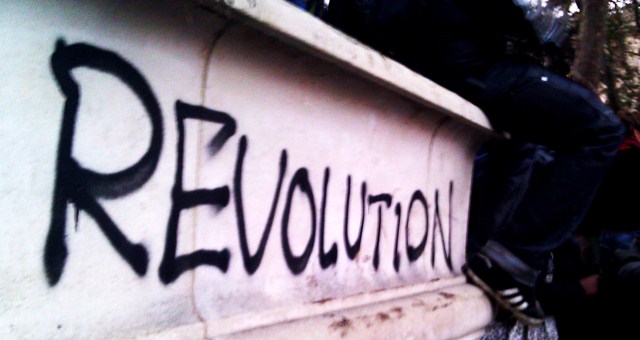Media “The Revolution Will Not Be Televised”
Film & TV, New in Ceasefire - Posted on Saturday, March 5, 2011 0:00 - 3 Comments

By Usayd Younis
As you probably know, American poet Gil Scott-Heron wrote a song by this title, first released in 1970. The track, labelled by the New Statesman as one of the “top 20 political songs”, has since received worldwide acclaim and recognition. The slogan itself: “The Revolution Will Not Be Televised”, though written over 40 years ago, is now seen by many as a timeless truth.
The song challenges commercially driven ‘popular’ culture and consumerism, often channelled through television, asserting that the needs of the people are, almost always, at odds with its inherent fallacies. Gil Scott’s wryly poetic words resonate with a single but powerful message: Whilst the television screen will continue to depict a false reality – “the people will,” as one verse says, “be in the street looking for a brighter day.”
2011 has been branded as ‘the year of revolution’. Popular uprisings in the ‘Arab world’ have resulted in the toppling of dictators in Tunisia and Egypt who had imposed repressive regimes on their own peoples for three decades. Demonstrations are now taking place across the region, with eyes now on Libya for a hopeful ousting of Muammar Gaddafi and an end to his 42 year reign.

Despite what popular discourse seems to imply, the attempted reclamation of a country by its people is far from rare. Furthermore, these are not isolated incidences, rather popular movements born out of the desire for greater justice and socio-economic equality. As one Al-Jazeera article reported: “Few seemed to care that Egypt was also part of Africa, a continent with a billion people, most living under despotic regimes and suffering economic strife and political suppression just like their Egyptian neighbours.”
Western political and media powers have attempted to confine the revolutions to a disgruntled ‘few’ in some distant, disconnected lands of the Middle-East, failing to recognise the brutal, endemic reality of the situation across the region and beyond. Similarly, just months before, the United Kingdom saw the uprisings of tens of thousands of students and others battling their government against suppressive ‘austerity measures’ – a movement which, like so many, is still growing.
Of course, Gil Scott-Heron wasn’t singing about a revolution in the Middle-East, he was challenging the far more insidious dictatorships of corporations. The revolution he foresaw wasn’t in the streets of Cairo, but in the streets of New York.
“The revolution will be live.”
Branded as the ‘social networking revolutions’, the mobilisation of people en-mass through tools like Twitter, YouTube and Facebook has introduced a new dynamic. Whilst some argue that the “new technology” side of these struggles has been overly-fixated upon – there has been a crucial change in the balance of powers.
Today, everyone is a source of news. The reliance on hierarchical, rigorously edited and often conformist ‘journalism’ is now counterbalanced by a constant stream of live information, photos and videos. Simultaneously, the direct monitoring and scrutiny of government propaganda is taking place on unprecedented levels. With regular unmasking and discrediting of errors and lacunae in reporting by the BBC, viewers are flocking to international broadcasters like Al-Jazeera, a network Hilary Clinton just this past week admitted was rising in popularity because it provided “real news”.
The use of modern-day tools to enforce draconian policies (monitoring, tracking etc.) is hardly a secret. However, this nascent revolutionary movement has proven that these very same tools can be quickly pointed the other way, to do the exact opposite. During the student protests in the UK last winter, the use of Twitter and live maps caught the police completely off-guard – so much so that new tools are being developed to harness these counter-authority tactics even further.
Gil Scott-Heron was right – the revolution won’t be televised. At least not until television is revolutionised. But with people taking control of the sources of knowledge, the spread of independent media in the form of articles, documentaries, music and film brings new hopes for a 21st century of freedom and democracy for all.
Usayd Younis is Ceasefire associate editor.
3 Comments
Omer
Thanks for the comment. I agree with your point on Al-Jazeera, the argument here is really that they have been far more accurate and proportional in their reporting of the uprisings in the Middle East.
There is no comparison made of Mubarak to UK austerity cuts, rather a call for solidarity. The struggles against neo-liberalism are being fought on many levels and I think it is important to recognise the wider context.
Rizwaan Sabir
A really interesting article Usayd – thanks!
I’m glad that social networking sites such as twitter, facebook and Youtube are being used for good purposes! Hopefully, they’ll be used in more creative and meticulous ways to ensure that our civil rights cannot be impeded or prevented by the police in the same ways that they were in the past (eg miners strikes and trade union activity)
The power of technology is incredibly wonderful, and if it’s utilised in a ‘smart’ way, it can cause real problems for those wishing to quash dissent and prevent ‘real’ change from occurring, whether it’s in this country or abroad.


Interesting article. However, I think comparing the UK government’s austerity measure’s to Mubarak’s policies is a stretch, Despite being a fan of AlJazeera myself, the network is not without flaws and is certainly not bias-free.
http://www.guardian.co.uk/world/2010/dec/05/wikileaks-cables-al-jazeera-qatari-foreign-policy